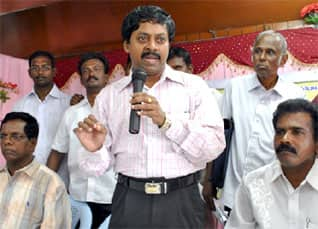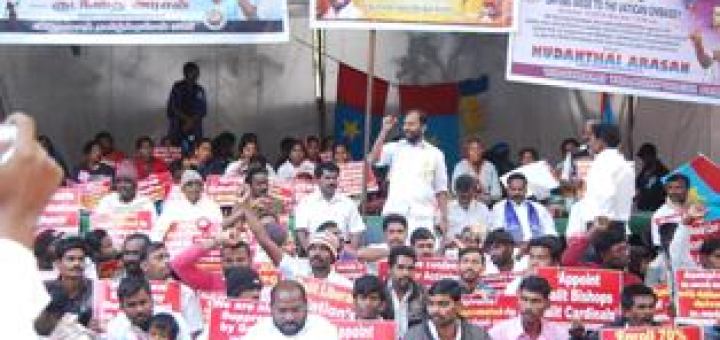India’s Minorities Commission Investigates Discrimination Dalit Christians
launched an investigation into the alleged discrimination of millions of Dalit Christians, officials said Monday, November 28.
The term Dalit is used for the so-called "untouchables" of India, up to 300-million people, who occupy the lowest place in India's ancient caste system of Hinduism. Several millions of them are believed to be Christians, although there are no exact figures.
Churches and several Christian advocacy groups have been urging the Indian Supreme Court to restore legal rights for Dalit Christians which were taken away from them in 1950.
AFFIRMATIVE ACTION
Although the Indian government promoted affirmative action positions to Hindu, Sikh, and Buddhist Dalits in university placements and government jobs, there was no mention of 'Christians'. Currently "when Dalits become Christians, they lose these rights," also referred to as 'reservations' added K.P. Yohannan, the president of Christian advocacy group Gospel for Asia (GFA), which supports native missionaries in India.
The NCRLM said it had already visited seven states to conduct research and ascertain the views of state governments. News of the ongoing investigations came after a weekend of public rallies in support of Dalit Christians in Orissa, an Indian state which has seen a series of attacks against Christians, BosNewsLife learned.
"The Dalit question comes up once again before the Supreme Court of India on Monday November 28 through the Public Interest Litigation writ filed by former Indian Law Minister Shanti Bhushan and other appeals by Dalit Christian groups," said John Dayal, president of the All India Catholic Union and an adviser to the government on religious affairs in a statement to BosNewsLife.
CENTRAL GOVERNMENT
"The Central Government has asked the [NCRLM] headed by [the] former Chief Justice of India, Rangnath Mishra, to also enquire into the issue," he added.
Dayal claimed that Hindu bureaucrats linked to the previous Indian government of the Bharatiya Janata Party "successfully stonewalled and sabotaged" the current "government's efforts to restore full legal rights to Dalit Christians snatched from them in 1950."
Several political parties have expressed support for giving equal rights to Dalit Christians, but human rights groups fear a long political and legal process before the matter is resolved. (With BosNewsLife's Vishal Arora in New Delhi and Stefan J. Bos at BosNewsLife News Center).


 திருநெல்வேலி : “”சட்டப்படி நான் இந்துதான். என் வழிபாட்டு உரிமையில் அரசாங்கம் தலையிட முடியாது,” என ஐ.ஏ.எஸ்., அதிகாரி உமாசங்கர் தெரிவித்தார்.
திருநெல்வேலி : “”சட்டப்படி நான் இந்துதான். என் வழிபாட்டு உரிமையில் அரசாங்கம் தலையிட முடியாது,” என ஐ.ஏ.எஸ்., அதிகாரி உமாசங்கர் தெரிவித்தார். சஸ்பெண்ட் செய்யப்பட்டு தற்போது டான்சி நிறுவன நிர்வாக இயக்குனராக பணியமர்த்தப்பட்டுள்ள உமாசங்கர் நேற்று நெல்லை வந்தார். பாளையங்கோட்டையில் மத்திய, மாநில எஸ்.சி., – எஸ்.டி., ஊழியர் சங்கம் ஏற்பாடு செய்திருந்த பாராட்டு விழாவில் பங்கேற்றார்.
சஸ்பெண்ட் செய்யப்பட்டு தற்போது டான்சி நிறுவன நிர்வாக இயக்குனராக பணியமர்த்தப்பட்டுள்ள உமாசங்கர் நேற்று நெல்லை வந்தார். பாளையங்கோட்டையில் மத்திய, மாநில எஸ்.சி., – எஸ்.டி., ஊழியர் சங்கம் ஏற்பாடு செய்திருந்த பாராட்டு விழாவில் பங்கேற்றார்.

 இந்து மதத்தில் இருந்து மதம் மாறி கிறிஸ்துவ, இஸ்லாம் போன்ற மதங்களை தழுவும் தாழ்த்தப் பட்ட, பழங்குடி இனத்தை சேர்ந்தவர்களுக்கு இடஒதுக்கீடு சலுகைகளை தொடர்ந்து வழங்குவது தொடர்பாக நீண்டகாலமாக பிரச்சினை நீடித்து வருகிறது. இந்து மதத்தில் இருந்தால் மட்டுமே அவர்களுக்கு சலுகை கிடைக்கும். மதம் மாறி விட்டால் தாழ்த்தப்பட்டோருக்கான சலுகை கிடைப்பதில்லை.
இந்து மதத்தில் இருந்து மதம் மாறி கிறிஸ்துவ, இஸ்லாம் போன்ற மதங்களை தழுவும் தாழ்த்தப் பட்ட, பழங்குடி இனத்தை சேர்ந்தவர்களுக்கு இடஒதுக்கீடு சலுகைகளை தொடர்ந்து வழங்குவது தொடர்பாக நீண்டகாலமாக பிரச்சினை நீடித்து வருகிறது. இந்து மதத்தில் இருந்தால் மட்டுமே அவர்களுக்கு சலுகை கிடைக்கும். மதம் மாறி விட்டால் தாழ்த்தப்பட்டோருக்கான சலுகை கிடைப்பதில்லை.











 The protestors from various dioceses of the Church of North India, which includedBishops,Pastors, Lay leaders men, women and young people, gathered at the CNI Bhavan and started for the venue of the rally at Jantar Mantar with prayers by Bishop M.U. Kasab, Bishop P.P.Habil and Mr. Prem Masih Acting Treasurer CNI Synod. During the rally, leaders from different denominations and Dalit organizations addressed the protestors and called upon them to peacefully fight against discrimination against Dalit Christians and Dalit Muslims. A peaceful dharna holding banners with slogans protesting anddemanding equal treatment by the Indian Government was organized .After the rally when the Church leaders including Archbishops ,Bishops , Nuns , lay leaders , and leaders of Dalit Christian organizations along with the Muslim Leaders were silently marching from JantarMantar towards the Parliament House demanding their due rights,suddenly the police intervened and brutally cane charged them. In order to disperse the peaceful protestors, the police resorted to use of water cannons and threw cold and dirty water with unbearable pressure on the protestors. As a result,a number of the protestors got badly injured.When despite all this high handed ness by the police, the protestors refused to leave the Protest March, the senior’s police officers present at the occasion declared that all the protestors werecourt arrested. Theyordered brought buses and by taking the protestors in custody took them to Parliament Street Police station and confined them to police custody.Those who courted arrest and were taken to police custody included the Christian leaders along with the CNI Synod, General Secretary, Mr. Alwan Masih, Bishop M.U. Kasab, Bishop Yunous Massey, Bishop Naresh Ambala, Bishop Warris Masih, Archbishop Anil JT Couto, Bishop Neetinathan, Dr John Dayal, Revd. Dr. Roger Gaikwad, General Secretary, NCCI, Mr. Samuel Jaykumar and Rev Philip Raj of NCCI,Mr. Vijayesh Lall EFI , Prof. Mary John NCDC , Mr. V. J. George, Mr. Franklin Caeser Thomas , other bishops and pastors, Fathers and nuns , women and youths . In spite of many having been badly beaten and wet due to water thrown on them , even during the custody , the protestors kept shouting slogans against the Government demanding SC rights for Dalit Christians and Dalit Muslims and they asked for the intervention of the Prime Minister of India. Late in the evening a message was received that the Prime Minister has called a delegation of 15 Christian and Muslim Leaders on the following day in the Parliament house, to meet him and to submit memorandum to him. After this the protestors were released from the police custody.
The protestors from various dioceses of the Church of North India, which includedBishops,Pastors, Lay leaders men, women and young people, gathered at the CNI Bhavan and started for the venue of the rally at Jantar Mantar with prayers by Bishop M.U. Kasab, Bishop P.P.Habil and Mr. Prem Masih Acting Treasurer CNI Synod. During the rally, leaders from different denominations and Dalit organizations addressed the protestors and called upon them to peacefully fight against discrimination against Dalit Christians and Dalit Muslims. A peaceful dharna holding banners with slogans protesting anddemanding equal treatment by the Indian Government was organized .After the rally when the Church leaders including Archbishops ,Bishops , Nuns , lay leaders , and leaders of Dalit Christian organizations along with the Muslim Leaders were silently marching from JantarMantar towards the Parliament House demanding their due rights,suddenly the police intervened and brutally cane charged them. In order to disperse the peaceful protestors, the police resorted to use of water cannons and threw cold and dirty water with unbearable pressure on the protestors. As a result,a number of the protestors got badly injured.When despite all this high handed ness by the police, the protestors refused to leave the Protest March, the senior’s police officers present at the occasion declared that all the protestors werecourt arrested. Theyordered brought buses and by taking the protestors in custody took them to Parliament Street Police station and confined them to police custody.Those who courted arrest and were taken to police custody included the Christian leaders along with the CNI Synod, General Secretary, Mr. Alwan Masih, Bishop M.U. Kasab, Bishop Yunous Massey, Bishop Naresh Ambala, Bishop Warris Masih, Archbishop Anil JT Couto, Bishop Neetinathan, Dr John Dayal, Revd. Dr. Roger Gaikwad, General Secretary, NCCI, Mr. Samuel Jaykumar and Rev Philip Raj of NCCI,Mr. Vijayesh Lall EFI , Prof. Mary John NCDC , Mr. V. J. George, Mr. Franklin Caeser Thomas , other bishops and pastors, Fathers and nuns , women and youths . In spite of many having been badly beaten and wet due to water thrown on them , even during the custody , the protestors kept shouting slogans against the Government demanding SC rights for Dalit Christians and Dalit Muslims and they asked for the intervention of the Prime Minister of India. Late in the evening a message was received that the Prime Minister has called a delegation of 15 Christian and Muslim Leaders on the following day in the Parliament house, to meet him and to submit memorandum to him. After this the protestors were released from the police custody. 


 Thirumavalavan
Thirumavalavan


